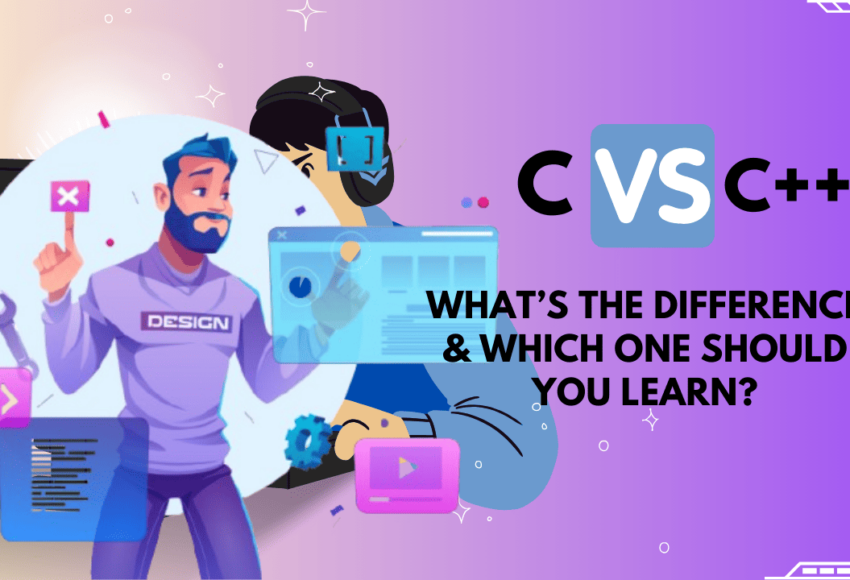
C vs. C++: What’s the Difference & Which One Should You Learn?
If you’re getting started with programming or considering a career in software development, you may have already encountered C and C++ — two of the most fundamental coding languages. But what is the actual difference between them? Since the most important one, which one should you master first?
Let us simplify and clarify and everything.
A Quick Introduction
One of the oldest and most powerful programming language is C. Though it was developed in the early 1970s, it’s a procedural language that is used to create system-level programs such as compilers, operating systems, and embedded systems.
C++ was developed afterwards as a superset of C by adding features such as classes and objects to become an object oriented programming language (OOP). This makes C++ great for developing bigger, more complicated applications like games, browsers, and enterprise software.
Key Differences Between C and C++
| Feature | C | C++ |
|---|---|---|
| Programming Style | Procedural | Procedural + Object-Oriented (OOP) |
| Use of Classes/Objects | Not supported | Fully supported |
| Code Structure | Simpler, function-based | Modular, supports encapsulation & inheritance |
| Speed | Slightly faster in low-level operations | Slightly slower but more flexible |
| Standard Library | Limited (manual coding required) | Richer library support (STL, etc.) |
| Applications | Operating systems, embedded systems | Software apps, games, GUI-based programs |
| Learning Curve | Slightly easier to start with basics | More concepts to understand (OOP, templates) |
When Should You Learn C?
Choose C if:
- You want to understand the core fundamentals of programming
- You’re interested in system-level programming (e.g., operating systems, device drivers)
- You’re studying computer science or electronics
- You want a strong grasp of memory management, pointers, and low-level operations
C teaches you how the computer works under the hood. It’s a great starting point if you’re curious about how software interacts with hardware.
When Should You Learn C++?
Choose C++ if:
- You want to build games, applications, or GUI-based software
- You’re interested in object-oriented programming
- You’re aiming for competitive programming or coding challenges (C++ is the favorite here!)
- You want to work on projects involving graphics, simulation, or large codebases
C++ allows you to write cleaner, modular, and reusable code — perfect for real-world software development.
Which One Should You Learn First?
This depends on your goals:
- If you’re focused on learning fundamentals, memory management, or diving deep into how things work at the system level — start with C.
- If you want to build apps, learn modern programming concepts, or enter fields like game dev or app dev — go with C++.
- Want the best of both worlds? Start with C for a few weeks, then switch to C++. Since C++ is based on C, your foundational knowledge will carry over.
Real-World Use Cases
- C is used in:
🔹 Linux kernel development
🔹 Embedded systems
🔹 Microcontroller programming
🔹 Database engines like MySQL - C++ is used in:
🔹 Game engines (Unreal Engine)
🔹 Desktop software (Adobe, Microsoft Office)
🔹 Browsers (Chrome, Firefox)
🔹 Financial systems and simulations
Final Thoughts
C and C++, both are as powerful and respected in the programming world. The C gives you the depth, and the C++ gives you the breadth. Both of these will sharpen your logical thinking, coding discipline and technical problem solving.
The good news? You don’t have to pick just one. Many programmers learn both — and that will give you a huge advantage in interviews, problem-solving, and learning how software works under the hood.




Leave a Comment